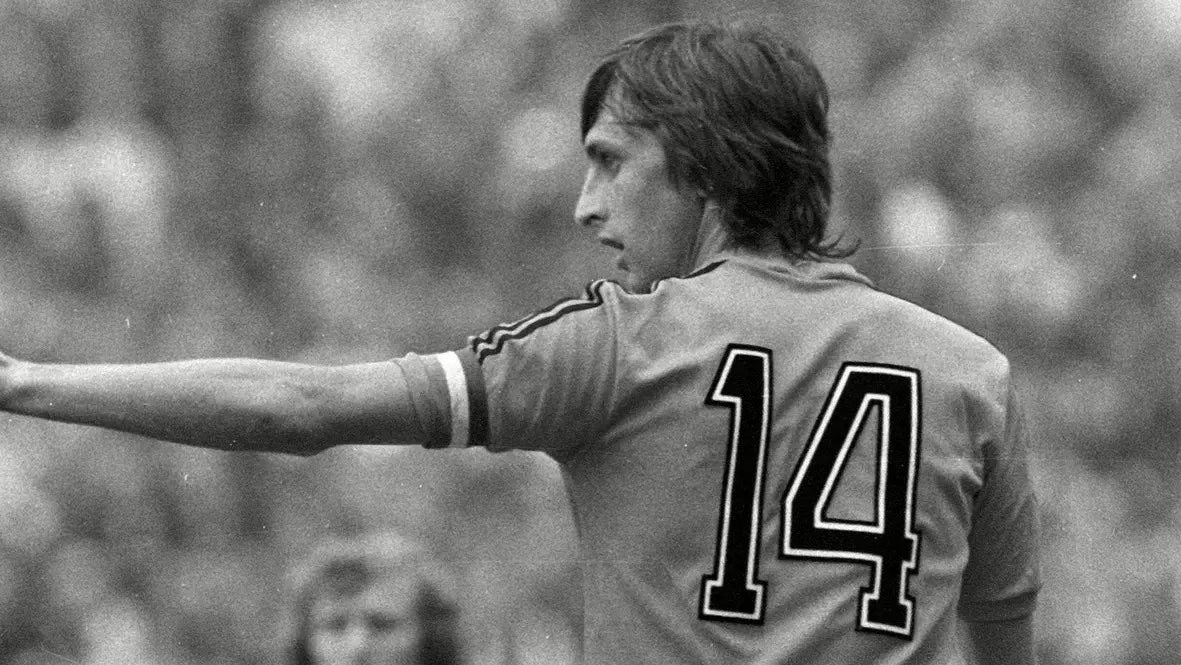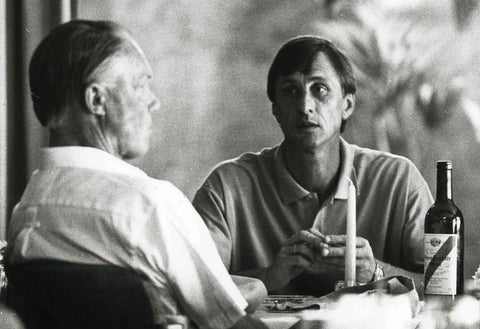
Johan Cruyff - The Dutch legend who invented modern soccer.
Johan Cruyff - The Dutch legend who invented modern soccer.
Born within a stone’s throw of the Ajax stadium in the east of Amsterdam, John Cruyff’s mother was a custodian for the club. Cruyff joined Amsterdam’s Ajax when he was just 10 years old, and by 17, made his debut with the senior team. It seems he was destined for the sport.

Terms often used to describe Cruyff include professor, legend, icon, pioneer and master. His vision and implementation of game-changing strategies illustrates the career of one of the greatest minds ever to grace the sport of football. Although not specifically a number 10, his philosophy, passion, vision about the game thoroughly represents how we see the game. Cruyff was a self-aware and intelligent man. He was also arrogant, ideological, and brutally honest.
AJAX AMSTERDAM AND TOTAL FOOTBALL
During his time with Ajax, Cruyff and the team took home 13 major trophies, including three consecutive European Cups. He was a proponent of the football philosophy known as “Total Football,” invented by Rinus Michels. Cruyff is widely regarded as one of the greatest players in the history of the sport, and one of the greatest managers. Individually, he collected three Ballon d'Or awards. The last was given in 1974 as he starred for the Netherlands in that summer's World Cup when the “Total Football” was executed with perfection on the pitch and went global.

Cruyff was always much more than a player, and his impact on the game is felt today in every major club in Europe. He is also one of football’s greatest myths, its greatest romance. His absolute and radical idea that the sport should be beautiful, that just as quality without results was pointless, results without quality was boring, he became the soul of the game.

GREATEST DUTCHMAN IN HISTORY
In 2004, the Netherlands conducted a public poll to determine the greatest Dutchman in history. They named Johan Cruyff as number six of all time, finishing just below humanist philosopher Desiderius Erasmus and above Anne Frank, Rembrandt, and Vincent Van Gogh!
Cruyff was a contemporary of both Pele and Diego Maradona during his playing career. He was a manager at a time when Arrigo Sacchi, Fabio Capello and Franz Beckenbauer were winning everything. One could argue that his reach extends far further than any of them. His legacy will continue to influence countless future generations, arguably more important than the great successes he achieved himself as a player or as a manager alone.

There are players who became legends. Pele, Rivaldo, Ronaldo (both of them), Zidane, Lionel Messi, Zico, Ronaldinho, Eusebio, Platini, Gerd Muller, Xavi, Marco van Basten, Gianluigi Buffon, Franz Beckenbauer, Alfredo di Stefano, and so on. The list is endless. Others with big personalities who built an even bigger legacy away from the game, include Eric Cantona, Socrates, Diego Maradona and George Best. There are others, like Pep Guardiola, whose time as a manager overshadows his playing career. Then there are managers, like Arrigo Sacchi, who were never players, but who changed the game.

Cruyff was great in every category. As a player, he was fantastic. He invented moves. He was the first player to win the Ballon d'Or three times. He turned the meek Netherlands into a footballing powerhouse.
CRUYFF MANAGER
As a manager, he was just as impressive. He won the European Cup and KNVB Cup (twice) with Ajax before going to Barcelona to win four league titles in a row among a multitude of other awards. He brought in the 3-4-3 formation, taking the attacking notion of “Total Football” of his former manager Rinus Michels, and making it his own.
“I was criticized for playing three at the back, but that’s the most idiotic thing I’ve ever heard. What we needed was to fill the middle of the pitch with players where we needed it most. I much prefer to win 5-4 than 1-0,” said Cruyff.
Like many legends, he was not exactly the world’s greatest athlete. He was thin, lanky, angular, like a dancer or a borderline anorexic rock star. He was fast, as you had to be, and his touch, control, and passing were all stellar, yet still somehow secondary. What Cruyff did was process the game in a way no one else had before. He had a genius for space, a genius that the author David Winner likened to that of the Dutch masters in his book “Brilliant Orange.”

As mentioned, Cruyff was guided throughout his playing career by the great Rinus Michels, working together at Ajax, Barcelona, Los Angeles Aztecs, and at the 1974 World Cup. In the 1974 World Cup tournament, the Dutch team, led by Cruyff and including Johan Neeskens and Ruud Krol, put on a memorable display that earned them the nickname “Clockwork Orange.”

Michels is credited with developing the strategy. It focused on fluidity and built on the success of the Austrian “Wunderteam” of the 1930’s and Hungary's “Magical Magyars” of 1950’s. Cruyff used the philosophy to create the “Tiki-taka” at Barcelona. “Total Football” is still guiding the club's academy training and youth recruitment. Years later, Louis van Gaal’s generation won the Champions League in 1995. Ajax is globally regarded as one of the best, if not THE best, youth development academy.
Imagine if Michael Jordan and Phil Jackson were the same person. That was the dynamic Cruyff possessed, and the impact he had on football. The legacies of Pele and Maradona are self-contained. What they stand for is their own greatness. No question about it. Their style of play has influenced players for decades.
By comparison, Cruyff stands for everything. He is the embodiment of the modern game, the intellectual wellspring of the world’s 3 best teams, Barcelona, Manchester City, Bayern Munich, and countless others. His disciples and their disciples have colonized the sport. If a team isn’t playing in some version of the style he developed, it is playing in a manner designed to thwart the team that is!

Cruyff changed the understanding of the game, and the game itself, forever. That’s why the iconic image of Cruyff isn’t of him scoring a goal—though this was a great and memorable one—or a trick, even if we named one after him. It’s him pointing, directing a teammate from one place on the field to another. He had a vision of how the game should be, and nothing was going to stop him from sharing it.
CRUYFF AND BARCELONA
His 1973 transfer to Barcelona was for a world record fee. After a glitzy spell in the United States, he went back to his beloved Ajax in the early 1980’s, and a final season with rivals Feyenoord. In Barcelona, “The Making of the Greatest Team in the World,” Spanish football writer Graham Hunter stated, Cruyff is "...pound for pound, the most important man in the history of football."

"Without him I wouldn't be here," Guardiola, himself now one of the all-time great managers, said of Cruyff in an interview with The Guardian in 2016. "Before he came we didn't have a cathedral of football, this beautiful church, at Barcelona. We needed something new. And now it is something that has lasted. It was built by one man, by Johan Cruyff, stone by stone. That's why he was special."
After his passing, Platini told AFP "Cruyff, he was the best player of all time. I've lost a friend, the world has lost a great man. I admired him, he was the best player of all time," said Platini, who like Cruyff, was a three-time winner of the European player of the year award.
Cruyff is immortal, because he now exists within the game itself. His influence is everywhere. It’s in the philosophies of Guardiola, Txiki Begiristain, Arsene Wenger, Ronald Koeman, Michael Laudrup, Luis Enrique, and is enriched by all of their achievements. He is alive in Ajax, and in every team that mimics Barcelona. He’s in the rapid, interchangeable movement of players, in one and two-touch football, and in the resulting spectacular goals. Cruyff exists in every player, manager or team that sees football not only as a problem to be solved, but as an art, as entertainment. He is what best represents the beautiful game.
Here are some of our favorite quotes by Johan Cruyff:
- “Technique is not being able to juggle a ball 1000 times. Anyone can do that by practicing. Then you can work in the circus. Technique is passing the ball with one touch, with the right speed, at the right foot of your team mate.”
- “You play football with your head, and your legs are there to help you.”
- Choose the best player for every position, and you’ll end up not with a strong XI, but with 11 strong 1’s.”
- "Playing football is very simple, but playing simple football is the hardest thing there is.”
- “In my teams, the goalie is the first attacker, and the striker the first defender.”
- “Why couldn’t you beat a richer club? I’ve never seen a bag of money score a goal.”
- “When you play a match, it is statistically proven that players actually have the ball 3 minutes on average … So, the most important thing is: what do you do during those 87 minutes when you do not have the ball. That is what determines whether you’re a good player or not.”
- “If you have the ball you must make the field as big as possible, and if you don’t have the ball you must make it as small as possible.”
It is our responsibility to educate younger generations about the real legends of the game. None of them were perfect on or off the pitch, but they achieved greatness and changed the game forever. Too many youngsters are impressed by irrelevant displays of skill. The difference is when these skills are applied with the right timing, executed the right way, with the right passion (the Cruyff way). This is what turns great players into LEGENDS. Join us in sharing the history, the love, the respect for these great legends.
Be a TENLEGEND™.

Comments
Marco Ottink said:
Hij zei voor zijn dood eigenlijk ben ik onsterfelijk door zijn legacy , de erfenis van Cruijff,Nederlandse jeugd wordt nog steeds opgeleid in zijn filosofie , zijn geest waakt over de Johan Cruijff Arena en over het jeugd complex de toekomst